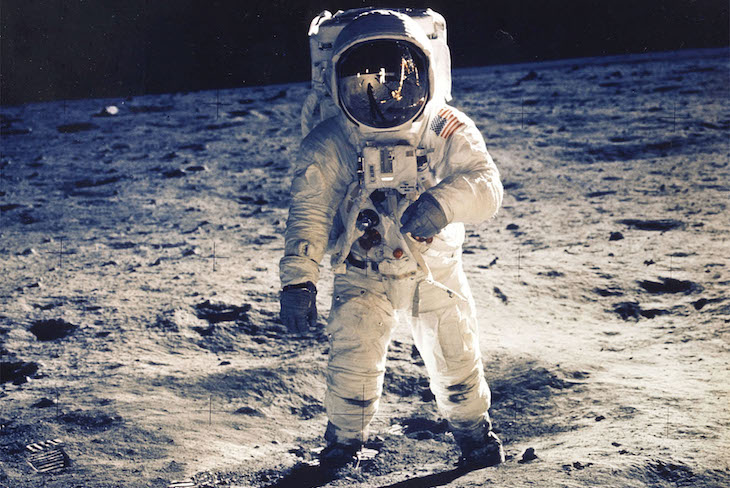Wally Funk is on a mission — to make real her dream that a woman will walk on the moon in her lifetime. She was one of 13 female pilots who trained at Nasa alongside the Mercury 7 astronauts as they prepared to go to the moon. But when the Apollo programme was abandoned in 1972 (in part because of the costs of the Vietnam war) her dreams of going into space were also junked. Now, though, she has renewed hope, as governments and corporations have resurrected the space race, no longer confined this time to America versus Russia but also involving China, India, the European Space Agency (Esa), as well as Virgin Galactic, Moon Express and Blue Origin.
In The Weekend Documentary on the World Service (produced by Sue Nelson), the distinctly unfunk-like Funk (who, from her vibrant voice and straight-talking presenting style, you can’t imagine funking anything, ever) took us back to the 1960s and Cape Canaveral. She recaptured the excitement of the lunar launches, everyone glued to their TV sets as the team at Nasa counted down to lift-off (even the telephone area code, 321, reflects that momentous era, Funk revealed). Back then, it all seemed very territorial, as Neil Armstrong planted the US flag in moon dust. Now the talk is all about exploiting the moon’s minerals, and its suitability as a stopping-off place on the way to Mars.
In Paris, meanwhile, within sight of the Eiffel Tower, Funk met the team behind Europe’s plans to build a space village on the moon, which will be international, free and open to everyone, fuelled by technological progress, and an ‘antidote to terrorism, economic crisis and climate change’. ‘That’s a big plan,’ remarked Funk. She was shown a sample brick made from simulated moon dust fused together in a microwave powered by solar energy. The brick was only half the normal size. ‘You’re gonna have to have an awful lot of dust,’ she told them.
She knows from her experience how difficult it is to realise your dream, and how suddenly you can be blown off course. ‘Are your astronauts learning Chinese?’ she asked, acutely aware that such practicalities are essential if space is to be truly free and open, and a place where the global community comes together. But after meeting Samantha Cristoforetti, an Italian astronaut who’s credited with being the first to brew an espresso in space and who speaks Russian and Chinese, she is beginning to think her mission might just be accomplished. ‘It’s just a shame it won’t be me.’ Too right, Ms Funk.
In The Conversation this week, also on the World Service, Kim Chakanetsa wondered why so few women, fewer than 3 per cent, have been involved in international peace negotiations. What is lost by their absence, Chakanetsa wanted to know, as she talked to Monica McWilliams, who played a key role in the Good Friday Agreement of 1998, which brought an end to the Troubles in Northern Ireland, and Hilde Salvesen, who was a member of the Norwegian team that facilitated the more recent peace negotiations between the Colombian government and the Farc rebels.
‘Peace processes are not just about silencing guns,’ said Salvesen. ‘They also make important provisions for change. It’s very precarious if you exclude 50 per cent of the population from such important discussions.’ McWilliams, who set up the Women’s Coalition in Northern Ireland, drawing from urban and rural, nationalist and unionist, Protestant and Catholic communities as a way to infiltrate the peacemaking process, explained how ‘we opened up ways to speak to all the armed groups.’
At first, though, McWilliams was not at all welcome at the negotiating table. She was told ‘to go home and have babies’. Undeterred, she endured the hostility, spurred on by her own experience of losing her boyfriend in 1974, shot dead by a member of one of the parties she was sitting opposite at the table. All of us have suffered, she told them; every single one of us has a responsibility to make these changes.
In A Month of Maureen, one of the most distinctive voices on Radio 4, Maureen Lipman, is being celebrated with four plays written specially for her. Each week they have been showcasing her inimitable style of female commentary, sharp but not acid, ordinary and yet never trivial, and her ability to play one minute a stern and buttoned-up single woman and the next a jokey, long-married wife. Especially comic yet poignant was Marcy Kahan’s contribution last week, ‘Five Lessons’, about a bestselling writer who turns up, incognito, at Julian Rhind-Tutt’s studio wanting a piano lesson. Week by week, more of her story is revealed as she industriously practises seven, eight, nine hours each day to master not just Für Elise but also Chopin. Lipman utterly convinces as the tight-lipped ‘PW’ finding a way out of her writer’s block. But she also displays her skill for working with other people, that perfect timing, matched by Rhind-Tutt, but never stealing the show, and always etching her character in strong, sharp lines so that we are never in doubt who she is. The production, too, by Marion Nancarrow is beautifully clear and perfectly paced, with just the right music at just the right moments.






Comments